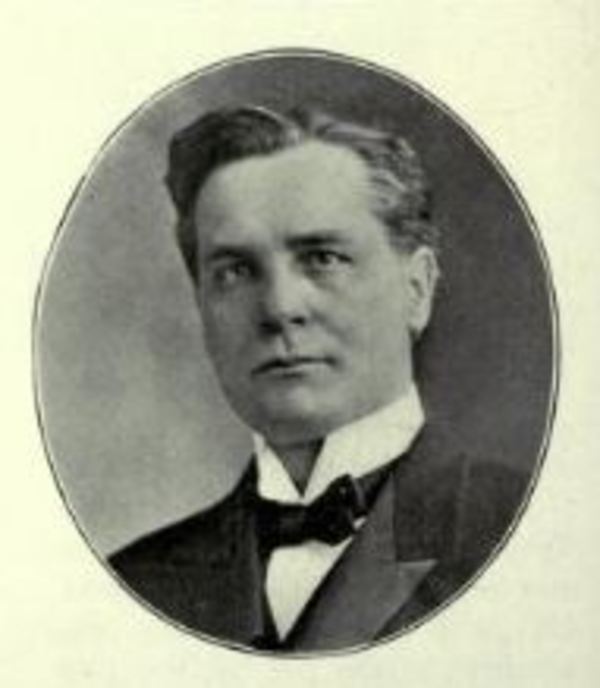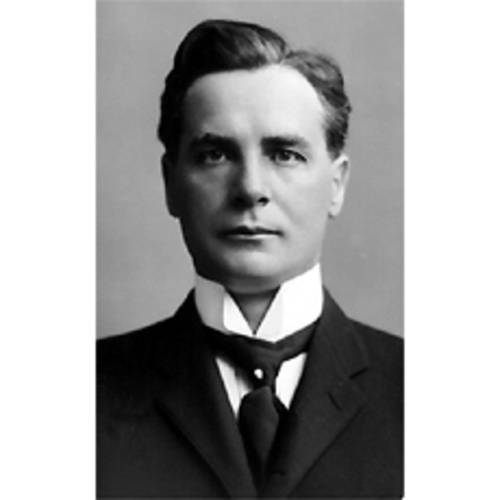
Source: Link
ARMSTRONG, Joseph EMANUEL, farmer, oil producer, politician, and manufacturer; b. 9 Nov. 1864 in West York, Upper Canada, son of Elijah Armstrong and Sarah Brown; m. 30 Dec. 1891 Margaret James Phipps (d. 7 Nov. 1936) in West Chester, Pa, and they had three daughters, one of whom died in infancy and another in young adulthood, and a son; d. 31 Jan. 1931 in Petrolia, Ont., and was buried three days later in nearby Sarnia.
Joseph E. Armstrong attended public schools in West York and later the Business College in Toronto. He was also a graduate of the National School of Elocution and Oratory in Philadelphia, where he met his future wife. Sometime in 1888 or 1889 he went with his father to Petrolia; in addition to farming there, the Armstrongs acquired a practical knowledge of oil drilling. Their move occurred at a time when the local oil boom was beginning to falter. Although nine-tenths of Canada’s production of crude oil was concentrated in Petrolia, its drillers and refiners were unable to compete in the domestic market with rival companies in the United States. Nevertheless, there were still profits to be made and Joseph Armstrong amassed a large amount of oil property; one of the leading producers in the district, by the mid 1920s he would have 76 wells in operation. According to his son, James Shelley Phipps, Armstrong also participated in the development of oilfields in Mexico and South America and was an early believer in the tar sands of Alberta, obtaining extensive concessions at Fort McMurray and investigating economic methods of extracting the oil.
During the 1890s a solid middle class succeeded in transforming Petrolia from a rough shanty town into a respectable Victorian community. A Methodist who became a Presbyterian, Armstrong was the embodiment of bourgeois ideals: he held a seat on the town council for three years, took out membership in the local chamber of commerce, and joined several fraternal organizations, including the freemasons, the Orange order, the Knights of Pythias, and the Oddfellows, which provided him with sociability as well as important business and political connections.
The demise of the local oil industry was virtually guaranteed in the summer of 1898 when the American conglomerate Standard Oil secured control of the Imperial Oil Company [see Jacob Lewis Englehart*]. By that time the growth of the Canadian consumer market for petroleum products had far outstripped Petrolia’s ability to supply crude. Its citizens established another firm, the Canadian Oil Refining Company, in 1901 and began to diversify their manufacturing base by shifting to agricultural products, a process in which Armstrong was involved both financially and as an advocate in parliament. In 1902 he and another local entrepreneur, William English, started the Lambton Creamery Company, which was incorporated in 1905; Armstrong would serve as its president for many years. The firm’s output of butter, intended for the English market, quickly reached nearly one ton a day and in 1909 the Glencoe Creamery was acquired as a branch plant. Armstrong also helped found the Petrolia Wagon Works in 1902. Misfortune dogged this enterprise, however, and it would be taken over in 1920 by a company controlled by Henry Cockshutt*; the firm went bankrupt two years later. In 1910 Armstrong was involved with Ernest D’Israeli Smith*, the prominent Winona jam maker and the husband of his sister Christina Ann, in establishing a cannery, the Lambton Packing Company, in Petrolia. The factory, which took over the former premises of the Petrolia Packing Company, began production in 1911, with Armstrong as managing director, and provided local farmers with a market for their peas, beans, and other cash crops. The plant operated until 1915, when it was closed for a time as a result of war conditions. Reopened by 1918, it again fell idle for some years before being sold to Canadian Canners in 1923.
Armstrong had entered federal politics in 1896, contesting the riding of Lambton East for the Protestant Protective Association [see D’Alton McCarthy*], but he was narrowly defeated by the Liberal candidate. In a by-election held in 1904 he was selected as the Conservative nominee. He prevailed over his Liberal rival, Charles Jenkins, also an oil producer, by the then-resounding majority of 586 votes. Armstrong sat in the House of Commons continuously until 1921, when he lost to Burt Wendell Fansher, a Euphemia Township farmer and a Progressive. He regained his seat in the 1925 election, but was defeated by Fansher the following year.
In the house Armstrong took a particular interest in transportation and communications. He was, for example, a proponent of the development of cold-storage facilities and in 1907 he castigated the Liberal administration of Sir Wilfrid Laurier* for not moving boldly enough on this issue. More important, he was the parliamentarian largely responsible for persuading Laurier’s government to experiment with free rural mail delivery, raising a question on the matter within a few months of entering parliament in 1904. At his own expense he investigated the workings of the system that had been introduced in the United States, and in the commons he pressed the issue whenever an opportunity presented itself. Outside the house his efforts were complemented from late 1905 by the letter-writing campaign of Ontario farmer George Wilcox. Although the postmaster general, Rodolphe Lemieux, roundly rejected the idea during debate in April 1908, six months later, with an election pending, the government introduced a limited service between Hamilton and Ancaster and indicated its intention to extend delivery to other routes. The system was expanded by Robert Laird Borden’s Conservative administration from 1911, and rural communication was transformed with the closure of thousands of small post offices.
Armstrong also championed government ownership and operation of telephones and telegraph lines. In 1919–20 he would argue unsuccessfully for state control as well over waterborne traffic both inland and along the coasts, with a view to obtaining lower freight rates. He applied himself equally to the matter of supplying coal from the west to central Canada; “on this subject,” the Petrolia Advertiser-Topic would later note, “he acquired and placed before Parliament an immense amount of practical material.” In 1914 he was made co-chair of the special committee of the House of Commons appointed to meet with a similar committee of the Senate to consolidate the Railway Act. Over the years he served on a number of parliamentary committees, including the standing committee on railways, canals, and telegraph lines and that on agriculture and colonization. Three years later he was among those selected by Borden’s Union government to inspect the Canadian Expeditionary Force in England and France.
Though concerned with national issues, Armstrong never forgot the interests of his constituency, and in parliament he was indefatigable in his pursuit of legislation calculated to promote local agriculture and the oil industry. “East Lambton,” one obituary commented, “never had a more faithful, painstaking or conscientious member.” Active in the Crude Oil Producers’ Association after its founding in 1924, Armstrong served at some point as its president. In early 1931 he was preparing to lead a delegation before Prime Minister Richard Bedford Bennett* and other officials to discuss the restoration of the bounty on crude oil that had been eliminated in 1925. He died before he could make the journey, succumbing to a brain haemorrhage that resulted from a fall on an icy pathway. He had suffered financially during the Great Depression and his estate was relatively modest. His wife survived him by five years. Of Quaker ancestry, she was, like her husband, a pillar of St Andrew’s Presbyterian Church in Petrolia, took an informed interest in politics, and was involved in various charitable organizations. The couple’s son, James, would be for many years Ontario’s agent general in the United Kingdom.
The DCB and the author are grateful to the subject’s grandson Joe C. W. Armstrong and his wife, Kathleen, for contributing family information to this article and for providing newspaper items and other materials relating to Joseph Emanuel Armstrong’s career.
AO, RG 80-8-0-1278, no.20200. Chester County Arch. & Record Services, “Marriage records, 1885–1930,” West Chester, Pa: www.chesco.org/index.aspx?NID=1174 (consulted 21 Sept. 2015). Advertiser-Topic (Petrolia, Ont.), 5, 12 Feb. 1931. London Free Press (London, Ont.), 2 Feb. 1931. Sarnia Canadian Observer (Sarnia, Ont.), 2 Feb. 1931. Christina Burr, Canada’s Victorian oil town: the transformation of Petrolia from a resource town into a Victorian community (Montreal and Kingston, Ont., 2006). Can., House of Commons, Debates, 11 Feb. 1926: 926–31. Canadian annual rev., 1904–21, 1925–26. Canadian directory of parl. (Johnson). Victor Lauriston, Lambton’s hundred years, 1849–1949 (Sarnia, [1949]). Edward Phelps, Petrolia, 1874–1974 (Petrolia, 1974). Who’s who in Canada, 1922.
Cite This Article
Christina Burr, “ARMSTRONG, JOSEPH EMANUEL,” in Dictionary of Canadian Biography, vol. 16, University of Toronto/Université Laval, 2003–, accessed December 28, 2025, https://www.biographi.ca/en/bio/armstrong_joseph_emanuel_16E.html.
The citation above shows the format for footnotes and endnotes according to the Chicago manual of style (16th edition). Information to be used in other citation formats:
| Permalink: | https://www.biographi.ca/en/bio/armstrong_joseph_emanuel_16E.html |
| Author of Article: | Christina Burr |
| Title of Article: | ARMSTRONG, JOSEPH EMANUEL |
| Publication Name: | Dictionary of Canadian Biography, vol. 16 |
| Publisher: | University of Toronto/Université Laval |
| Year of publication: | 2017 |
| Year of revision: | 2017 |
| Access Date: | December 28, 2025 |




